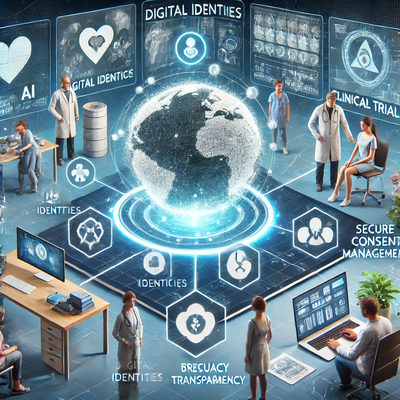Digital security solutions empower patients to participate more easily in clinical studies

Within the ITEA project Secur-e-Health, that integrates new solutions to preserve privacy in healthcare collaborations, Canadian project partners Kelvin Zero, Identos and Perceiv AI have delivered significant outcomes in their use case for the COLCOT-T2D trial. This trial, conducted using the MeTRO platform, is a large global virtual clinical trial on prevention of heart disease in people with type 2 diabetes. A unique aspect of this trial is its strong focus on patient engagement.
The MeTRO platform creates a single point of contact for patients, clinicians, and researchers to interact in an siteless clinical trial. The platform consists of a collection of tools that were developed by multiple parties, including integrations with critical components built by Secur-e-Health project partners. These components include Kelvin Zero's digital identities and signatures, traceability and transparency of the records via the Distributed and Decentralised Data Layer (DDDL, completing a blockchain implementation) as well as consent management that is akin to the work completed by Identos. It also connected the Perceiv AI precision medicine and predictions platform.
Developed during the trial, the MeTRO tools have rapidly transformed clinical research by streamlining processes, reducing costs, and improving efficiency. In Canada, the Montreal Heart Institute’s clinical teams, the Montreal Health Innovations Coordinating Center (MHICC), and clinical partners like Ecogene-21 have adopted these tools, empowering patients to participate more easily in clinical studies. Participation can now be done fully remotely and facilitates participation by those with limited mobility. It also increases the pool of eligible patients for each trial. The success of the MeTRO platform has also led to partnerships with organisations like Optina Diagnostics (conducting research on Alzheimer’s disease) and Inogen (developing portable oxygen technology), as well as collaborations with clinics and research centers, such as RRSPUM (University of Montréal).
The trial’s impact extends beyond the immediate research outcomes. It has helped to train and retain highly qualified personnel (HQPs) specialising in digital health tools, and strengthened the capabilities of the MeTRO team at MHICC, which could hire 23 HQPs from November 2023 to February 2024. The initiative has also enhanced the global reputation of MHICC in the field of virtual clinical trials and supported the growth of its joint activities with the Pharmacogenomics Centre (PGx Centre, focusing on using genetic data to predict patient responses to medications).
Looking forward, the next steps for the MeTRO platform will focus on further optimisation and expansion. This includes refining its tools and exploring opportunities to promote and potentially export the platform for use in new markets and trials, further enhancing its impact and utility.
More information:
Related projects
Secur-e-Health
Privacy preserving cross-organizational data analysis in the healthcare sector


